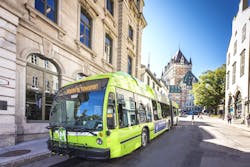BAE Systems Delivers its 7,000th Hybrid-Electric System for Buses
BAE Systems recently celebrated its 7,000th delivery of a series hybrid-electric system for buses by meeting orders from a transit agency in Canada. The delivery marks a major milestone towards greater vehicle electrification of the transit bus market.
Global demand for hybrid-electric and fully electric transit solutions is increasing as more legislation is passed setting clean air regulations and transit agencies continue to establish goals for greener fleets. Réseau de transport de la Capitale (RTC) in Quebec has, for instance, a goal to operate a fully electric fleet and is using hybrid technology as a bridge to all-electric buses. In order to help RTC reach its goal, the 7,000th system was delivered to manufacturer Nova Bus to meet RTC bus orders.
To date, RTC has received more than 50 40-foot and 60-foot articulated buses powered by BAE Systems’ electric power and drive systems, and it is continuing to receive hybrid-electric powered buses to help reach its clean air goals. RTC and many heavily populated cities use the longer, 60-foot articulated bus, which joins an extra 20-foot section to a 40-foot bus, to accommodate more passengers during peak periods.
The company’s Series-E system is configured to power buses with hybrid-electric power, and the same system components can also be configured to drive on pure-electric power by adding more batteries and removing the diesel engine. The Series-E system enables transit agencies, as well as maintenance and training staff, to transition to electric systems from their known mechanical systems and diesel power. Today BAE Systems has fully-electric buses in operation in cities such as Palm Springs, California; Flint, Michigan; Boston, Massachusetts; London, United Kingdom; and Paris, France.
With 7,000 HybriDrive propulsion systems operating around the world, more than 1 billion passengers are helping to save 15 million gallons of fuel each year while eliminating 160,000 tons of CO2 from entering the atmosphere.
